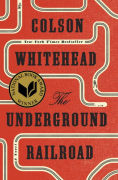As most people know by now, the protagonist of this popular, award-winning novel is Cora, a young slave on the Randall plantation in pre-Civil War Georgia. After experiencing the brutality of Cora’s life there, the reader might think Cora would jump at the idea of escape, but we understand her reluctance when we see how recaptured slaves are tortured. Eventually, though, a slave newly arrived from Virginia persuades Cora to run away with him. He’s made contact with the underground railroad, which contrary to popular wisdom extends into Georgia.
Of course, the real underground railroad did not reach Georgia, so we quickly learn that the author is going to play fast and loose with the truth. Depicting the railroad as real trains running through real tunnels under the ground is only the most famous of the fantasies in this book. Among other things, skyscrapers and the Tuskegee Airmen appear a hundred years early, and the dreams of the American Colonization Society are imagined as having been made into law in North Carolina.
I realise this is fiction and recognise the metaphorical weight of these unreal elements.
Still, I wish the author had added an afterword separating what was real from what was false. It is disturbing that some readers will take much of this as fact. Even worse, given so much that is exaggerated or false, other readers will question the book’s brutal depiction of slavery. There are plenty of people in the U.S. who believe the false narrative that slaves were treated well and were happy in their work. While this is powerfully refuted by the book, especially the part on the plantation, it won’t help if people decide that it, too, is exaggerated.
Many in my book club disagreed with me, asserting that it was fiction so we shouldn’t have any expectation that it would conform with reality. Some also disagreed with me about Cora herself. I didn’t feel as though she came alive as a character. She seemed to me a cipher, deliberately empty so that the reader could imagine ourselves into that space, while they found her distinctly individual and realistic.
If I thought that Cora and all of the other characters could have been more fleshed out, I have nothing but admiration for Whitehead’s world-building. He brought each place and its culture to life such that they still linger in my memory. From the first page to the last, Cora’s life depends on her ability to suss out each new environment she enters, uncovering its secrets, identifying the dangers and guessing who can be trusted. As I traveled with her, I understood a tiny bit better what it must feel like, even today, to walk the streets—and drive the highways—as a person of color. Such an expansion of empathy is one of the greatest gifts of fiction, as I’ve said before.
I thought the book powerful and gruesome. Although I appreciated it more on an intellectual level than an emotional one, I find myself pondering many of its ideas. I think about the alternate forms of communication among the powerless and the fierce hold of an obsession. I think about the great cost of one person’s push for freedom and the stories that we would like to tell about ourselves. I think about the blood and injustice upon which this country was founded.
Have you read this book? What did you think of it?

